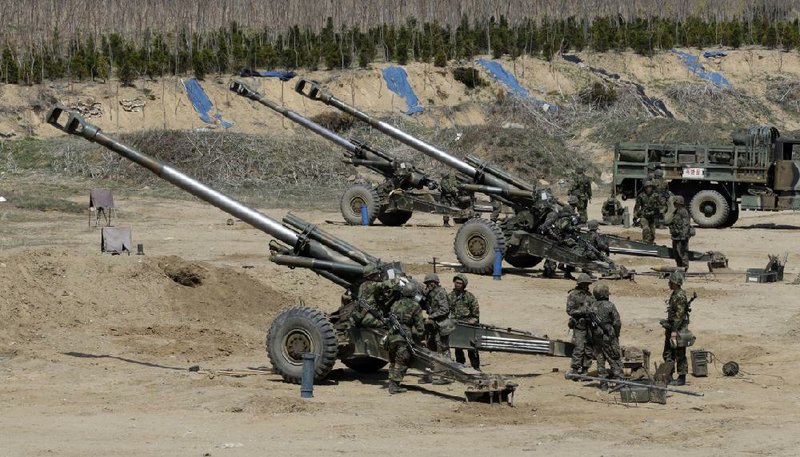SEOUL, South Korea - North Korea on Thursday demanded the lifting of United Nations sanctions and an end to joint U.S.-South Korean military exercises as preconditions for starting dialogue to defuse tension on the Korean Peninsula.
By making demands that the United States and South Korea have no intention of accepting, North Korea signaled that it would not back down anytime soon from a military standoff that has lasted for weeks.
But the fact that North Korea has recently begun responding to U.S. and South Korean offers for dialogue, even though they came with steep preconditions, has raised cautious hopes among South Korean analysts that the North might be ready to wind down weeks of hostile rhetoric that at times appeared to move the peninsula close to a point of conflict.
“They should take measures of retracting the U.N. Security Council’s ‘resolutions on sanctions’ cooked up under absurd pretexts,” the Policy Department of the National Defense Commission, North Korea’s highest governing body, said in a statement carried by its official Korean Central News Agency. “They should give formal assurances before the world that they would not stage again such nuclear war drills to threaten or blackmail” the North, it added.
The statement demanded that the United States withdraw “all nuclear war means” from South Korea. It also said South Korea must stop making negative assertions about North Korea, such as its accusation blaming North Korea for a cyber-attack that paralyzed the computer networks of South Korean broadcasters and banks last month.
It also taunted President Park Geun-hye of South Korea, saying that she should consider the North’s nuclear weapons “a property common to the nation.” Park has repeatedly said that nuclear weapons would only bring North Korea “self-destruction.”
After weeks of tit-for-tat escalation of tension with North Korea, South Korea offered dialogue last Thursday. During his trip in the region last weekend, U.S. Secretary of State John Kerry said “our preference would be to get to talks.”
His comment helped calm jitters in the region, which has been rattled not only by the North’s nuclear brinkmanship but also by Washington’s unusual show of strength, including the training missions of nuclear-capable B-52 and B-2 bombers, as well as F-22 Stealth fighter jets, over South Korea.
But Kerry also reaffirmed Washington’s condition that North Korea must first “make it clear they will move to denuclearizing as part of the talks.”
North Korea had rejected those offers, calling them “cunning” deceits.
A gulf of differences remains. North Korea insisted that it would never negotiate away its nuclear weapons. Both the South and the United States are equally determined to break what Park calls a “vicious cycle” of the allies answering the North’s hostile behavior with compromise.
The South Koreans, “along with their American master, are still talking such nonsense as ‘denuclearization’ in the North in a bid to make a bargain over its nukes,” said a spokesman for the North’s Committee for the Peaceful Reunification of Korea on Thursday. “They would be well advised to drop such daydream.”
He said the North was “technically at a nuclear war with the U.S.” North Korea said last month that the 1953 armistice that halted the Korean War was “totally nullified.”
North Korea has ratcheted up tension on the divided peninsula for weeks out of anger over the U.N. sanctions imposed for its Feb. 12 nuclear test.
Also Thursday, the top U.S. intelligence official disclosed that a congressman inadvertently revealed classified information when he read aloud a passage from a Defense Intelligence Agency report that said North Korea had the know-how to put a nuclear warhead on a missile.
Director of National Intelligence James Clapper told the Senate Armed Services Committee that the paragraph read out loud by Rep. Doug Lamborn, R-Colo., at a House hearing last week was “miscategorized as unclassified.”
“The section in question was clearly labeled as unclassified. Additionally, Armed Services Committee staff confirmed the classification level of the relevant section in writing with Defense Intelligence Agency before it was introduced in last week’s hearing,” said Claude Chafin, a spokesman for the Republican majority on the House Armed Services Committee.
A spokesman for Clapper, Shawn Turner, said by e-mail that the agency mislabeled that section of the report.
Clapper repeated his contention in the hearing that North Korea has made progress on its ballistic missile and nuclear program, but “has not, however, fully developed, tested or demonstrated the full range of capabilities necessary for a nuclear-armed missile.”
He said that the “[Defense Intelligence Agency] has a higher confidence level than the rest of the community on that capability,” part of what he called the “healthy debate and disagreement,” over the issue.
Agency director Lt. Gen. Michael Flynn, who also testified, said the seven-page classified document was produced in March and that the “differences in levels of assessment” on North Korea’s capability stemmed from “a difference in how we judge assumptions in this case.” He refused to provide further detail in an open hearing.
Information for this article was contributed by Choe Sang-Hun of The New York Times and by Kimberly Dozier of The Associated Press.
Front Section, Pages 5 on 04/19/2013

